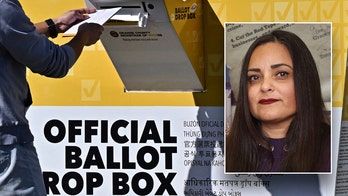
Kevin Jennings, assistant deputy secretary for the Department of Education's Office of Safe and Drug-Free Schools. (AP)
A bill in Congress that would prohibit discrimination in public schools based on sexual orientation or gender identity could stifle free speech and even lead to "homosexual indoctrination" in the nation's classrooms, critics say.
The Student Non-Discrimination Act (SNDA), or H.R. 4530, was introduced late last month by Colorado Rep. Jared Polis, with 60 co-sponsors. Polis, the first openly gay man elected to the House as a nonincumbent, said the legislation will put lesbian, gay, bisexual and transgender students on "equal footing" with their peers, much as Title VI of the Civil Rights Act of 1964 did for minorities and Title IX did for women.
"Hatred has no place in the classroom," Polis, a Democrat, said in a statement on Jan. 27. "Every student has the right to an education free from harassment and violence. This bill will protect the freedoms of our students and enshrine the values of equality and opportunity in the classroom."
But some critics say the bill, if passed, could lead to murky definitions of harassment and provide a universal approach to the nation's public schools despite regional differences on lesbian, gay, bisexual and transgender (LGBT) issues.
"The real danger is how this will be interpreted," said Neal McCluskey, associate director of the Center for Educational Freedom at the Cato Institute, a Washington-based libertarian think tank. "The definition of harassment could be broadly interpreted that anybody who expressed a totally legitimate opinion about homosexual behavior could be made illegal.
"That's a violation of those kids who want to express opposition to LGBT opinions or behavior. People have a legitimate reason to be concerned about this -- not because they're 'haters' but because you're now trying to balance different rights."
Other critics, meanwhile, say the bill will be used to push what they say is a homosexual agenda in public schools.
"It seems pretty consistent with Kevin Jennings being appointed in the Obama administration," said Mat Staver, founder and chairman of Liberty Counsel, a nonprofit public interest law firm, referring to the controversial founder of the Gay, Lesbian and Straight Education Network who now serves as the assistant deputy secretary for the Department of Education's Office of Safe and Drug-Free Schools.
Jennings came under fire in September after acknowledging he should have better handled an incident in 1988 when he was a teacher and failed to report that a boy he believed was 15 years old told him he was having sex with an older man. (Since that time, the former student, referred to as "Brewster," has revealed he was 16 years old, the age of consent in Massachusetts, at the time of the incident.)
"When [Jennings] founded GLSEN, his idea of a safe school was one that pushed a radical homosexual agenda by even encouraging first and second-graders to engage in homosexual activity," Staver said. "So I think that's the impetus behind this bill. We have an administration that wants to push a radical social agenda."
According to the bill, discrimination against students based on sexual orientation or gender identity represents a "distinct and especially severe problem" that has contributed to high dropout and absenteeism rates, adverse health consequences and academic underachievement.
"When left unchecked, discrimination, including harassment, bullying, intimidation and violence, in schools based on sexual orientation or gender identity can lead, and has lead [sic] to, life-threatening violence and to suicide," the bill reads.
Federal civil rights statutes explicitly address discrimination on the basis of race, color, sex, religion, disability and national origin, but they do not include "sexual orientation" or gender identity. "As a result, students and parents have often had limited legal recourse to redress for discrimination on the basis of sexual orientation or gender identity," the bill continues.
H.R. 4530 is closely modeled after Title IX of the Education Amendments of 1972, which bans discrimination on the basis of sex. It contains the threat of loss of federal funding for non-compliant schools and says that no state may be immune under the 14th Amendment to the Constitution from suit in federal court for violating the Act.
If this is passed," McCluskey said, "it's going to almost certainly in some places be interpreted far too broadly, and free-speech rights will be trampled."
Numerous liberal-leaning groups -- including the American Civil Liberties Union, the Human Rights Campaign and GLSEN -- quickly applauded the legislation when it was introduced.
GLSEN Executive Director Eliza Byard said discrimination based on sexual orientation is a "pervasive problem" that negatively affects student performance.
Eighty-six percent of gay, bisexual or transgender students experience harassment at school due to their sexual orientation, and one-third -- five times higher than a national sample of all students -- missed a day of school in the past month because of feeling unsafe, according to GLSEN's 2007 National School Climate Survey.
"Discrimination of any kind is wrong," Byard said in a statement. "Far too many schools do nothing to address the hostile environments that LGBT students face. We owe it to our children to do everything we can to make sure that discrimination is eliminated from our schools."
But critics say enacting federal law is not the solution. Matthew Ladner, vice president of research at the Goldwater Institute, a Phoenix-based government watchdog group, agreed that discrimination of any kind is a "bad thing," but he questioned whether federal law will resolve differences of opinion regarding LGBT rights.
"Those kinds of conflicts are not resolvable by a federal mandate," he said. "The question is, is there a one-size-fits-all policy for every school in the country on this? It's more appropriate to settle it on the state and local level. Some states would be far more in favor of this than others."
Staver, of the Liberty Council, said the legislation is intolerant of any "opposing or traditional" views and called on Congress to be more focused on the country's economic woes, the wars in Iraq and Afghanistan and the threat of terrorism.
"Those are serious matter that I think American people are concerned with," he said.
He said he doesn't think the bill, which has bipartisan support, will pass, saying it's "completely contrary" to American values.
Asked if the Obama administration supports the measure, White House spokesman Shin Inouye said: "While we have not reviewed this specific legislation, the President believes that every child should learn in a safe and secure school environment."




